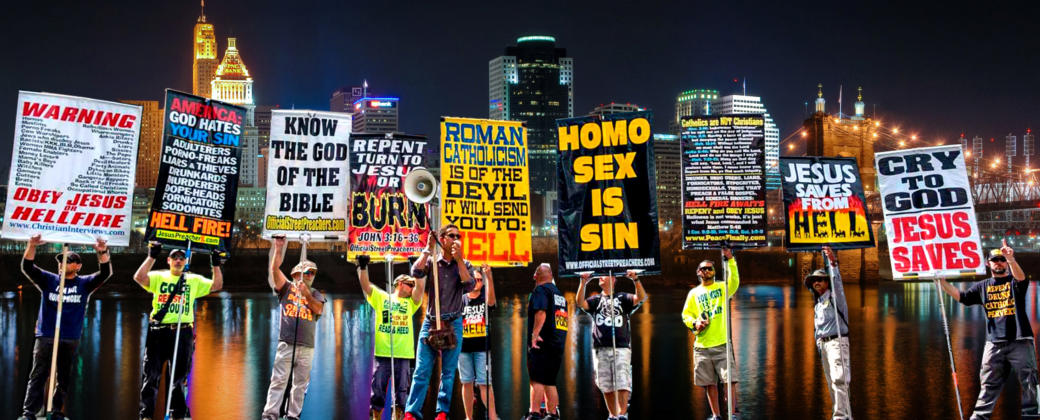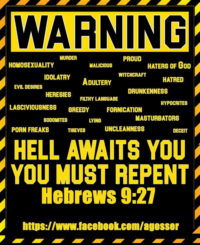Israel Folau did not quote the Bible.
Israel Folau shared a ‘meme’.
The meme, as demonstrated below, comes from a street preaching circle in the United States that one could legitimately describe as a non-Biblical ‘hate preaching’ ministry that has a track record of distorting the Gospel and cherry-picking the sins it features to condemn the sexual proclivity of the modern west, but that has significant blindspots that lead to a distorted representation of the Biblical source material. The ‘ministry,’ like Folau’s meme, conveniently ignores an equally pressing besetting sin of the western world, and at least one of the preachers in question: greed.

The ‘meme,’ pictured above, paraphrased the Bible but also flips its audience from Christian to non-Christian, and misrepresents the text in question. The image Folau shared comes from a context (this street preaching group) that determined what parts of the Bible passage were highlighted. The list of sins in the image comes from, but does not quote, 1 Corinthians 6:9-10.
Or do you not know that wrongdoers will not inherit the kingdom of God? Do not be deceived: Neither the sexually immoral nor idolaters nor adulterers nor men who have sex with men nor thieves nor the greedy nor drunkards nor slanderers nor swindlers will inherit the kingdom of God.” — 1 Corinthians 6:9-10 (NIV)
Folau’s social media presence reveals a tendency to quote the King James Version of the Bible, which, is, of itself an interesting phenomenon within the church — the KJV is a favourite volume of those who are suspicious of ‘modern’ ‘human’ re-writers of the Bible, which is a deep irony built on a reasonable amount of ignorance around Bible translation and history. The KJV translates these verses in this way:
Know ye not that the unrighteous shall not inherit the kingdom of God? Be not deceived: neither fornicators, nor idolaters, nor adulterers, nor effeminate, nor abusers of themselves with mankind, nor thieves, nor covetous, nor drunkards, nor revilers, nor extortioners, shall inherit the kingdom of God. — 1 Corinthians 6:9-10 (KJV)
The original, or earliest, rendering of this text from Paul’s letter to the Corinthians that we have, used in english Bible translation is:
ἢ οὐκ οἴδατε ὅτι ἄδικοι θεοῦ βασιλείαν οὐ κληρονομήσουσιν; μὴ πλανᾶσθε: οὔτε πόρνοι οὔτε εἰδωλολάτραι οὔτε μοιχοὶ οὔτε μαλακοὶ οὔτε ἀρσενοκοῖται οὔτε κλέπται οὔτε πλεονέκται, οὐ μέθυσοι, οὐλοίδοροι, οὐχ ἅρπαγες βασιλείαν θεοῦ κληρονομήσουσιν.
And this isn’t a point I’m making lightly – because those who want to make a simple ‘black and white’ case that Folau quoted the Bible and so is being persecuted for being a faithful Christian need to ponder how helpfully his meme renders the words μαλακοὶ and ἀρσενοκοῖται, which are the two words for homosexual sex (behaviour) combined in the NIV translation, or separated as ‘effeminate’ and ‘abusers of themselves with mankind’ in the KJV. Whether these map carefully and accurately onto the modern word ‘homosexual’ is an important discussion to consider when determining how much the meme accurately represents the Bible. I don’t think it does. I believe, and have a long track record of arguing that ‘homosexuality’ as a label describes a person’s orientation to the world, their sexual attraction, their proclivity to ‘lust’, and that these for people ultimately (often) end up in same sex sexual activity of the sort Paul prohibits. The Bible doesn’t directly speak to orientation or attraction, but it does talk about behaviour in a way that people with any orientation or attraction have to take on board when submitting to the authority or rule of Jesus and the re-ordering of our hearts and lives when we move from “worshipping created things” as Paul describes our sinful state, to “worshipping the creator.” The meme misrepresents the relationship between ‘sinners’ and ‘sin’ established by Paul, who is emphasising sinful activity or action, not an orientation or desire (though in 1 Corinthians 6:11 he does say ‘such as some of you were’ and our orientation, attraction, desires, lusts, and actions are often integrated so that actions are an expression of orientation. For anybody who becomes a Christian, gay or straight, the call to repent and turn to Jesus is the call to re-orient ourselves in the world and so moderate our attractions, desires, and behaviour accordingly.
So, that’s one strike against the idea that Folau ‘quoted the Bible’ via this image (at least in this image, it doesn’t seem to me that he’s in trouble for quoting Galatians in the text attached to this image in his post). Another strike would be that in the context of Corinthians, Paul has just spoken about how the church in Corinth should engage with the world, and how they should respond to sexual immorality — he says they’re to keep themselves pure, exercising judgment on sexual morality in the church, but leave judging those outside the church to God (1 Corinthians 5). I’m not one to quote Matthew 7:1 as though it should stop us seeing behaviours that are against the express revealed will of God as ‘not sinful’ or some sort of wishy washy revisionism, but I am going to point out that there’s a difference between writing to Christians telling them not to behave like the world, and writing to the world telling them to behave like Christians and taking the position of God when doing so — judging them — it is not for me to declare that ‘hell awaits’ anybody; it’s for me to declare the Gospel of Jesus, and him crucified (as was Paul’s description of his practice in Corinth in 1 Corinthians 1-2, a message he summarises to include the resurrection in 1 Corinthians 15).
This is a second strike; the third is to reframe Paul’s statement about ‘inheriting the kingdom of God’ to ‘hell awaits’ the other. It’s not that judgment isn’t a thing, Biblically, it’s that a causal link between these particular sins — that are symptoms — and judgment, is not a point Paul is making in this text. Also, when Paul does get to 1 Corinthians 15 his argument isn’t ‘heaven v hell’ but ‘death and dust in Adam’ v ‘life and imperishability’ in Jesus. We tend not to be super careful about making a distinction between Hades and the lake of fire reserved for Satan, his minions, death and hades, and those who reject Jesus; and I’m not convinced a person whose flesh has not been made imperishable by the Spirit of God (ala 1 Corinthians 15) lasts for very long in Revelation’s lake of fire… but this is a much more contested point than the one I’m making with this third strike against the meme; that the Bible as a whole, and Paul’s letter to the Corinthians in particular, don’t make judgment about particular sins, or particular types of sinner, but about whether one accepts Jesus as Lord and receives the Spirit, and life, or whether one rejects Jesus.
This is a point made by Jesus himself about what earns judgment, in, for example, John 3. Where ‘seeing’ the Kingdom of God requires being ‘born of the Spirit,’ which comes through believing in Jesus (John 3:3-16), but death comes as the ongoing result of not being born again and judgment comes on the pivotal question not of what sins I commit as a result of rejecting Jesus, but on the question of whether or not I reject Jesus.
For God did not send his Son into the world to condemn the world, but to save the world through him. Whoever believes in him is not condemned, but whoever does not believe stands condemned already because they have not believed in the name of God’s one and only Son. — John 3:17-18
So that’s three strikes. I’m not sure you can say someone ‘quotes’ the Bible if they take a message from the Bible written to Christians, that has a particular context within a letter, and then turn it around to say something else to non-Christians, in an apparent direct contradiction with the verses from right next door (1 Corinthians 5). It’s not ‘quoting the Bible’ if you obscure in your translation decision what the original makes clear (the move from ‘homosexual sex’ to ‘homosexuals’). It’s misquoting the Bible. ‘Quoting the Bible’ is also not the ‘shibboleth’ test Christians seem to be treating it as — it’s possible to quote, say, Job’s friends or Satan as he is tempting Jesus, without the literary context, and to say very untrue things about the world.
But here’s two more questions to raise about Folau’s post (and this is not to say Folau should have lost his job for sharing his religious beliefs publicly, but rather to say, Folau did not lose his job for quoting the Bible).
- Is it wise to try to reduce the teaching of the Bible into memes, or even just into single verses to pump out via social media devoid of the context both of the Bible as a coherent whole, and a real relationship with the person you are communicating to? And;
- Where did this meme actually come from, and to what extent should that frame questions about how helpful and Biblical its content is?
The first one is one where people will no doubt reach different convictions based on communication theory and an understanding of the ‘content’ of a proclamation of the Gospel; ie what ‘communicating’ the Gospel as a message involves in terms of content, and how this ‘content’ should shape the context we give it as communicators. How much does our ‘message’ need to inform and shape ‘our mediums’. I wrote a thesis on this question, basically, so I won’t revisit that here…
But the second question is quite instructive. Google’s ‘reverse image’ function reveals there’s no public, track record of this image being shared online (this doesn’t mean it’s not been shared and circulated on systems that might be closed to Google’s image search function (like Instagram)). Its presence on the web in the form Folau used it, directly coincides with Folau’s publication of the image; and correlation is causation in this case.
I also waded through, thanks to reverse image searching some of his other posts, Pinterest boards of other images Folau has shared on Twitter and Instagram over the last 12 months, and it appears he gets images from a wide variety of sources. He has a penchant for criticising prosperity preaching (and Joel Osteen and Hillsong cop his ire regularly). In the fallout of last year’s similar controversy, he shared a video from David Wilkerson (the guy who wrote The Cross and The Switchblade), who is popular amongst a certain corner of the Christian ‘dark’ web — those who believe the church, in its current form, have compromised and that faithful preaching looks a lot like taking to the street with placards. Folau is getting his content from somewhere, and he got this image from somewhere, and where it came from (both when he found it, and originally) is not irrelevant; especially not in the realm of ‘memes’ and how they are circulated and distributed.
In the early days of the Folau controversy I asked what the difference between his ‘quotes’ from the Bible and the quotes from the Bible featured on Westboro Baptist signs were, because there is more to faithful proclamation of the Gospel than just taking bits of the Bible that name specific sinful behaviours, convicting people of that, and telling them to make some sort of belief transfer to Jesus; there’s more to ‘evangelism’ than just holding up a placard and shouting. But I wasn’t sure there was a legitimate link between a Westboro sign and Folau’s meme; as a result of a reasonably deep dive into the source of Folau’s image, now I’m not so convinced the comparison isn’t apt; and that rather than the picture being ‘quoting the Bible’ it isn’t a certain form or re-appropriating the Bible for a ‘hate speech’ based approach to preaching.
My reservations about Folau’s communication strategy on social media are much the same as my reservations about Westboro; though I don’t think he is a ‘teacher’ in a church in the same way Fred Phelps is, so I think his actions are well intended and wrong, rather than the horrid actions of a false preacher; Folau’s post is the fruit of that sort of false preaching and wrong use of the Bible taking hold in the lives of real people searching for a coherent truth about the world, and sin, and Jesus. Folau’s post is the product of a tradition that puts the emphasis on those ‘blocks’ in all the wrong places in a way that distorts the truth and misrepresents it to a world ill equipped to have conversations about sin and judgment (especially when it comes to the way it tackles the sexuality issue).
Folau did, however, source this image from somewhere. Because the image does exist in a variety of forms, with some variations. It is used by a couple of street preaching ministries in the United States, appearing both in the ‘Bulldog Ministries’ (bulldogministries.com) ‘evangelism’ of David Stokes in Texas and surrounds, and the ‘ChristianInterviews.com’ (site now defunct) ministry of Aden Rusfeldt in Philadelphia. Both seem affiliated with OfficialStreetPreachers.com; which features images linking to ‘ChristianInterviews’ and is linked to by Bulldog Ministries. Official Street Preachers features this charming assembly of some of their signs (an earlier version of this post had this image as the header, which led to some confusion and concern on social media, the header image has now been changed).

Here’s the Facebook page and YouTube channel for Rusfeldt’s ministry, and a gallery of public preaching from both sites featuring signs identical to, similar to, and from the same ‘family’ as Folau’s meme.
From what I can tell, the earliest use of these signs that are the source material for Folau’s memes come from Stokes, in that this news article from 2012 describes the graphic pretty well.
“The first thing that really draws the eye, though, is the enormous sign he’s carrying.
“WARNING,” it reads, in five-inch high orange letters. “Drunks, homosexuals, abortionist [sic], adulterers, liars, fornicators, thieves, atheists, witches, idolaters, HELL AWAITS YOU.”
More recently, in Philadelphia, the sign has been part of an array used by Aden Rusfeldt. Here’s a fascinating profile of his mission strategy in Philadelphia, containing some interesting data that brings into question the decision to not, include greed in the ‘ChristianInterviews’ placards.
“And Pastor Aden knows what it’s like have your soul saved. He, too, used to be a seemingly hopeless sinner. Pastor Aden had sex before marriage. He used to drink heavily. He polluted his body with marijuana.
That’s the stuff that Pastor Aden tells you about when he gives you his “testimony,” as Christians call it — the story of their salvation.
But he leaves some stuff off of that list.
Pastor Aden has been fined millions of dollars by the federal Commodity Futures Trading Commission over investment schemes he ran as far back as 2005 and as recently as 2015. According to the government, he was known as “Big A” to many of the people whose money he took. The CFTC found that he “defrauded customers.”
And a few weeks ago, the Internal Revenue Service filed an $800,000-plus federal income tax lien against Pastor Aden and his wife in Bucks County, where they may or may not live.”
That’s not the only place Rusfeldt (and others) choose to leave greed off the list. It’s also interesting to ponder why ‘slanderers’ or ‘revilers’ don’t make the graphics, given that 1 Corinthians 6 is their origin. The dropping off of ‘greed’ from a list of sins in order to emphasise the sexual deviancy of the western world is a distortion of the difference between lust and greed; both are about false worship of created things (sex, or money and possessions). It’s not a cheap rhetorical move to ask why the guy being paid a million bucks a year shares an image that doesn’t mention it, it’s pointing to a massive cultural blindspot within Christian responses to the west. We’re great at throwing rocks at people who don’t match our sexual ethic, but not great at seeing where our economic ethic marches in lockstep with the world — or in the case of one of the promulgators of the meme Folau shared, where we’re running ahead of the world into swindly theft built from greed and carefully retelling our story to avoid that while living in a mansion.
And it’s not a ‘genetic fallacy’ thing to trace the source of this meme back to this petrie dish of hate preaching. Folau saw this image somewhere. It’s not circulating on the regular internet in obvious places. He has made a deliberate decision to pass on a meme — the study of ‘memetics’ is all about how memes function a bit like genes; that ideas transmit through different networks in particular and connected ways. The area of memetics is interesting and a bit disputed (and comes from Richard Dawkins, and is built on evolutionary science, which might poison the well for some Christians). But when we say ‘Folau just shared a meme’ we’re buying into a certain sort of idea transmission and communication theory that says that meme is connected by heritage to what came before, and remains connected as it evolves. Whether the Gospel is, itself, something like a meme — or whether it can be reduced to an internet meme — is another question; but what’s instructive in this case is that the origin of our communication material will shape what is communicated, and that will shape how the communication is received and the reaction it earns; and at this point Christians can rest a little easier, because Folau didn’t just quote the Bible, and had he just quoted the Bible we can’t know what the reaction might have been. He shared an image that has been used by people reducing the Bible to a message of hate, targetting an ‘other’ that those people hate and see as corrupting the world, while being oblivious to their own corruption (in the area of greed), and promoting an ongoing ignorance to that issue.














Comments
[…] as a way to disguise hate speech. So Christians have to call this out for same reason it’s worth calling out the hateful origins of Israel Folau’s meme, and the ACL’s endorsement of One Nation, and the ‘culture wars’ as a phenomenon; […]
Excellent article.
I wonder how the proposed Religious Freedom Act will help a person who misinterprets religion. The current protection for a person in Israel’s situation is freedom of thought and expression. He can be wrong, yet have the right to think that way and express it (within the confines of all other laws).
Yet, depending on how it’s drafted, freedom of religion according to the new Act, may come with the responsibility to ensure that the thought & expression is true to doctrine or scripture, and not of personal faith or opinion.
Of course, forwarding a meme would be determined by the origin of the meme.
Here’s an article of a similar nature (but you were first!)
https://theworldnews.net/au-news/did-israel-folau-actually-misquote-the-bible-hell-yes
There’s a lot of people reading a lot of things into this meme, and coming to all sorts of conclusions.
“Hell awaits” does not mean any particular people or groups of people are going to hell. It just means hell is there and prepared to accept them. Hell is prepared to accept everybody really, it’s just that Folau apparently feels that some people are particularly “going astray” from not knowing this and so a message targeted to them could help. It’s a warning not a condemnation.
The word “homosexual” is used in Folau’s bible. He quoted 1 Corinthians 6:9-10 in his Players voice article a year or so ago. The word “homosexual” is used as a translation of ἀρσενοκοῖται. In this case, it means a man who sleeps with a man, and not a man who has desires to sleep with a man. It’s quite possible that Folau is using the word as a “do-er” type word, and not the more widespread meaning.
Secondly, it doesn’t matter what Folau thinks “homosexual” means because the listed groups are just who the “warning” is addressed to. Warnings are given to people who might reasonably benefit from them, normally with knowledge that some of the people being given the warning don’t need it. Folau’s groups are just a bunch of people likely to particularly “benefit” from his message – i.e. groups likely to have engaged in sin or likely to engage in sin in the future. Drawing an implication that all members of his groups have without doubt sinned is going way to far.
Most of the groups on the list are defined by a sin, but to do the same unambiguously for people who have, or are going to engage in, homosexual acts would have made that item be a long multi-word item, and break up the “word consistency” of the message. It would look out of place. It’s not normally necessary to address a warning so precisely, and is often counter productive due to making it difficult to read, and anyone might benefit, so it doesn’t matter if the warning is addressed a bit wider.
The meme may well have originated among “street preachers” or hate groups. But as you say, it could have come to Folau via any number of jumps. Judging him on where it originated is akin to judging German Shepard owners to be Nazis because Hitler owned a German Shepard. Of course it’s quite possible that any particular German Shepard owner could be a Nazi, but you need actual evidence of it, not just some common element that may be removed by many steps.
You make a good point about people leaving out sins of a financial nature.
A very interesting and well researched read. It is very surprising, indeed astonishing, to me that the contents of this article did not recieve more notice in the general reporting of this issue. However the media cycle has moved on. 1) Theological points raised about what believing Christians think is the correct interpretation of the bible and how this compares to this meme. 2) The obnoxious source code of the material that was presented and its obvious hateful agenda. And to think that a sophisticated, first world country such as ours had such a long socio-political “controversy” about this material. This speaks badly of the religio-political Right, the ACL and their Conservative allies, in this country and its nasty agenda. An agenda that was so well elaborated in this article and the linked article “The alt-right pony and Christian conspiracy theory”. But we’ve come to expect this from that lot. Well what about the mainstream religious response to this material? It appeared to waiver between acceptance, acquiescence, silence or outright support of this material? What about their role in this issue, or must we default to blaming the media coverage? It would be interesting to read the author’s thoughts on this. Otherwise, if I was a believing Christian, I think I would engage a good lawyer (not Martyn Isles) and sue Folau on behalf of Jesus. Sue him for defamation and misrepresentation.